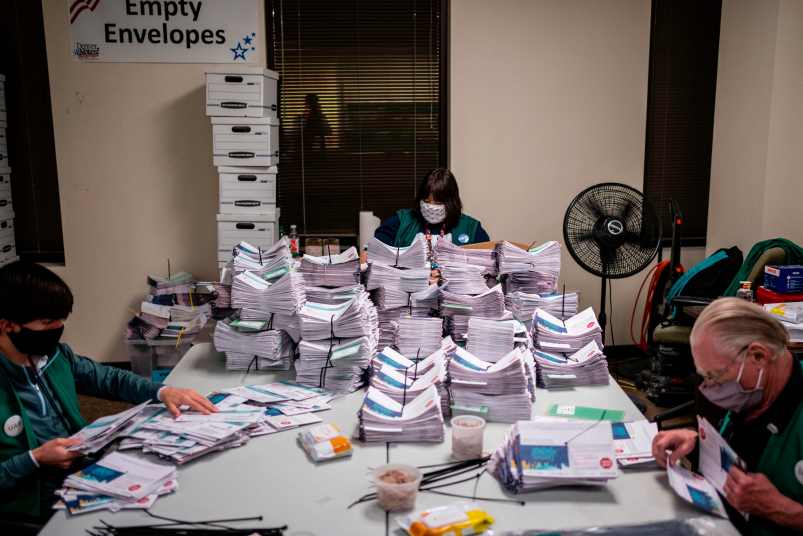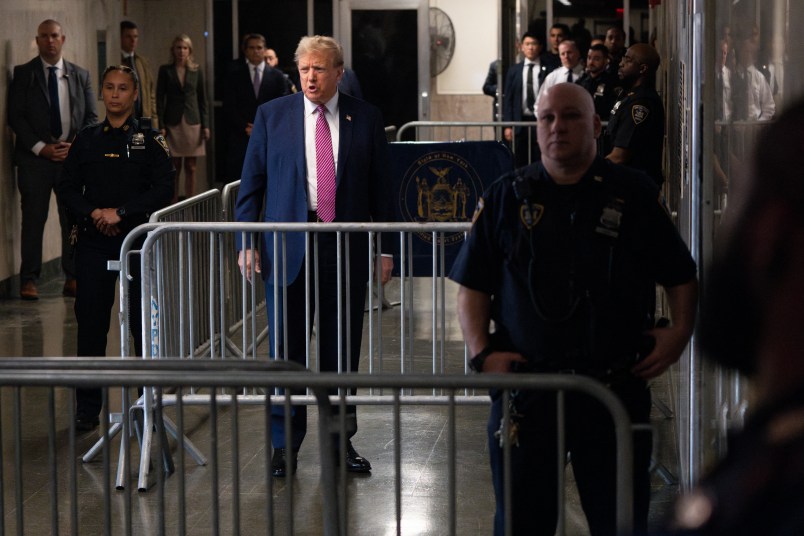A federal judge in Colorado has sanctioned two lawyers who he said pursued “bad faith” litigation that falsely alleged widespread illegal behavior in the 2020 election, ordering the attorneys to pay the legal fees of several states, private companies and individuals targeted by the suit.
Attorneys Gary D. Fielder and Ernest John Walker filed a “frivolous” case and “did not conduct a reasonable inquiry into whether the factual contentions had evidentiary support,” Magistrate Judge N. Reid Neureiter wrote in a sharp 68-page opinion against the pair.
As several other high-profile pro-Trump attorneys — including Sidney Powell and Lin Wood — face potential sanctions for a separate lawsuit in Michigan, the ruling against Fielder and Walker shows one instance of the courts penalizing lawyers for a “Big Lie” lawsuit.
Fielder and Walker filed a lawsuit on Dec. 22 against a who’s-who of Trumpian punching bags: Dominion Voting Systems, Facebook and the governors and top elections officials in Georgia, Pennsylvania, Wisconsin and Michigan, among other parties.
The lawsuit alleged among other things that the defendants engaged in concerted action to interfere with the 2020 election, including with a coordinated effort to, among other things, “use unreliable voting machines, alter votes through an illegitimate adjudication process, provide illegal methods of voting, [and] count illegal votes.”
The complaint stated that it was brought against the defendants for “burdening the voting rights of 160 million people” and sought $160 billion in damages.
‘No Rational Answer’
The plaintiffs claimed they weren’t trying to reverse the election, Neureiter wrote, but the effect of the allegations would be to sow doubt over Biden’s presidency and American democracy itself.
“In short, this was no slip-and-fall at the grocery store,” he continued. “Albeit disorganized and fantastical, the Complaint’s allegations are extraordinarily serious and, if accepted as true by large numbers of people, are the stuff of which violent insurrections are made.”
Neureiter ticked through various claims and affidavits cited in the complaint and patiently pointed out that “belief” is not the same thing as evidence. The judge also noted that the case faced the same standing issues as several other suits — it lacked “particularized individual injury.”
“Plaintiffs’ effort to distinguish this case from what I referred to as a ‘veritable tsunami’ of adverse precedent was not just unpersuasive but crossed the border into the frivolous,” he wrote.
Neureiter also took issue with the plaintiffs move to charge various other states’ officials in their individual capacity, despite suing in a court in Colorado, officials from which were not targeted by the suit. The plaintiffs dismissed the state officials from the case, but only after the officials filed motions to dismiss the suit.
“When asked why it took motions to dismiss before Plaintiffs’ counsel researched the question of personal jurisdiction, and why the research had not been conducted prior to the filing of the lawsuit, Mr. Fielder had no rational answer,” the judge wrote.
‘Plaintiffs’ Counsel Spoke To No One’
The judge reserved his harshest criticism for the near-total lack of due diligence from the lawyers. Given the stakes of the lawsuit and the fact that several other similar suits had failed, he noted, Fielder and Walker had their work cut out for them — work that they clearly did not do.
He noted that the state of Texas sought and failed to overturn the election at the Supreme Court before Fielder and Walker filed their own suit — and that “Texas’ effort is notable because Plaintiffs’ Complaint duplicates almost verbatim many of the allegations from that failed Supreme Court case.”
Neureiter said the attorneys also engaged in “litigation by ‘cut-and-paste’” by citing twelve paragraphs of Powell’s failed lawsuit in Georgia, including the claim that voting software in the state “was created to rig elections.”
“Plaintiffs’ counsel had a heightened duty of diligence and investigation before filing a copy-job pleading containing the same previously rejected theories and allegations,” the judge wrote. “Lawyers acting in good faith and without any meaningful time constraints would have taken the time to do additional original research into the validity of the allegations they were repeating.”
At the hearing last month, Fielder protested that he had a “good faith” belief that the election was stolen. He cited theories by other attorneys and Trump allies — such as, no kidding, MyPillow CEO Mike Lindell.
“These are serious allegations, made by serious people,” he said.
Neureiter addressed that on Wednesday.
“[A]s cited above, there was substantial public evidence that these were not serious people, and the numerous courts’ rejection of the lawyers’ arguments and factual claims should have put Plaintiffs’ counsel on notice to be very cautious before repeating these damaging allegations via a massive cut-and-paste job, without additional strenuous verification efforts,” he wrote.
“Plaintiffs’ counsel should have spoken to some of the other lawyers whose complaints they were copying into this lawsuit. Plaintiffs’ counsel should have confronted the authors of those failed lawsuits with evidence and public information that seemed to refute their claims to test their legitimacy. They should have done the same with the expert’s whose affidavits or reports they were citing.”
“Instead, Plaintiffs’ counsel spoke to no one.”










